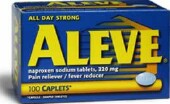- 8 Ways to Increase Dopamine Naturally
- 7 Best Breads for Maintaining Stable Blood Sugar
- Gelatin vs. Collagen: Which is Best for Skin, Nails, and Joints?
- The Long-Term Effects of Daily Turmeric Supplements on Liver Health
- Could Your Grocery Store Meat Be Causing Recurring UTIs?
- Are You Making This Expensive Thermostat Error This Winter?
- Recognizing the Signs of Hypothyroidism
- 10 Strategies to Overcome Insomnia
- Could Artificial Sweeteners Be Aging the Brain Faster?
- Techniques for Soothing Your Nervous System
FDA Panel Sees No Heart-Safety Advantage With Naproxen


The science isn’t convincing enough to say that naproxen — the key pain reliever in Aleve — is safer for the heart than other popular anti-inflammatory drugs such as ibuprofen (Advil and Motrin), U.S. health advisers ruled Tuesday.
The decision was highly anticipated, since a vote in favor of naproxen’s superiority might have led to a product labeling change, experts said.
However, the 16-9 vote by the advisory panel to the U.S. Food and Drug Administration did not find enough evidence to put naproxen ahead of other pain relievers in terms of heart risk. The FDA isn’t required to follow the recommendations of its advisory committees but it usually does so.
Naproxen, ibuprofen and aspirin fall under the umbrella term nonsteroidal anti-inflammatory drugs (NSAIDs). Millions of people take these medicines to help relieve muscle aches, headaches and pain from arthritis and injuries. These medicines also include the prescription drug Celebrex.
Since 2005, labeling laws have required a heart warning on these anti-inflammatory drugs. That warning stemmed from Merck’s withdrawal of the NSAID Vioxx from the market in 2004 because of a notable increased risk of heart attack among Vioxx users.
An FDA panel concluded earlier this month that naproxen didn’t seem to carry the same heart risks as the other NSAIDs. That decision was based on a safety review involving 350,000 people using different pain relievers.
But the FDA advisory committee decided Tuesday, after two days of hearings, that there wasn’t enough evidence to state that naproxen was safer for the heart.
“If I were forced to bet on what the truth is, my bet would be that naproxen is somewhat safer,” panelist Dr. Susan Ellenberg, of the University of Pennsylvania, told the Associated Press. “On the other hand, I’m not sure how that relates to our regulatory standard, as there’s still a lot of uncertainty here.”
But another panelist, Dr. Peter Kaboli of the University of Iowa, told the AP: “I’m convinced enough to change my own use of NSAIDs to naproxen, and that of my patients, based on what I’ve heard these last two days.”
Aspirin wasn’t a focus of this week’s hearings.
More information
The American College of Rheumatology has more about pain relievers.
Source: HealthDay
Copyright © 2026 HealthDay. All rights reserved.










